Understanding Delta 8 versus THC Without Getting Lost in Chemistry
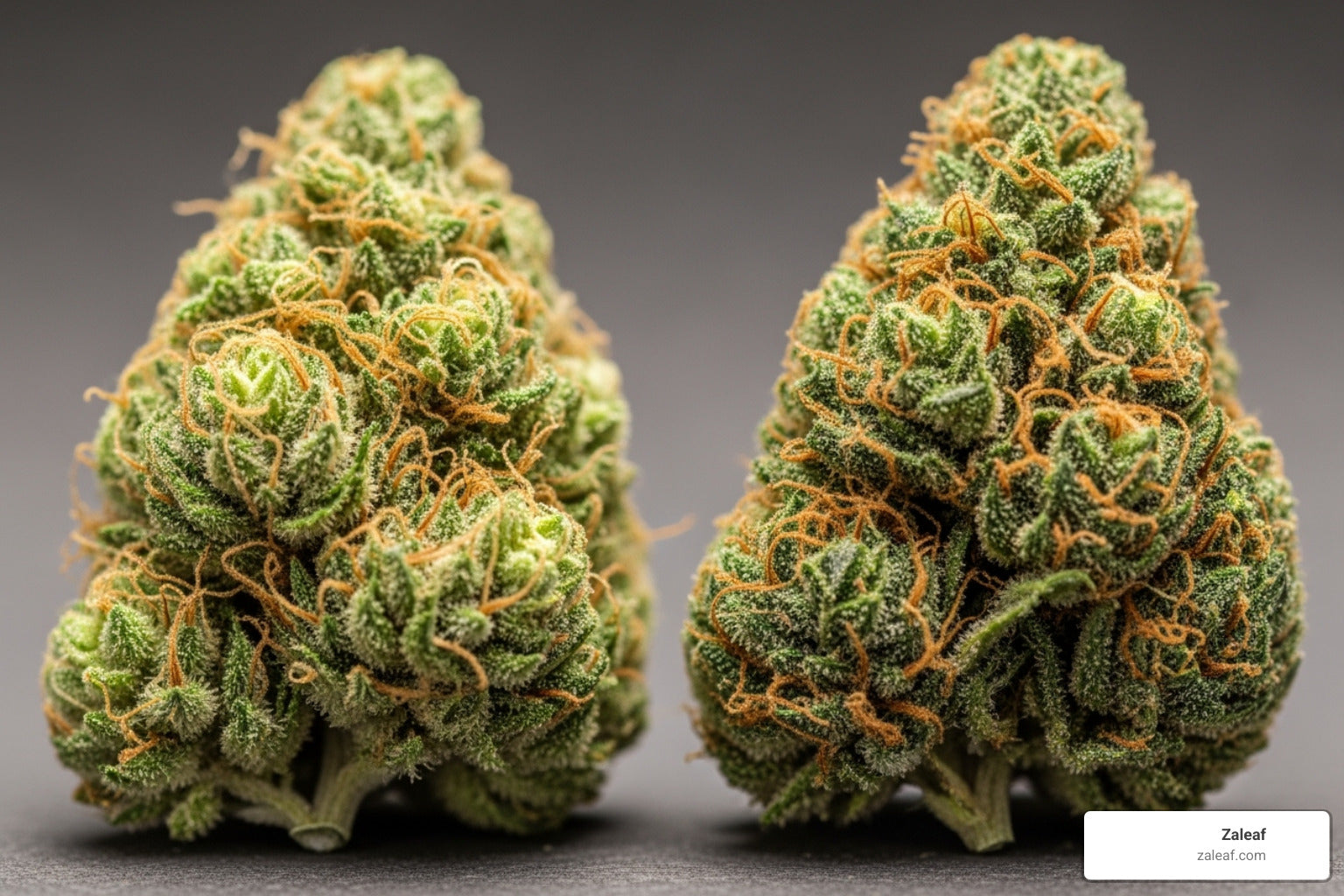
Why Delta 8 versus THC Matters for Modern Cannabis Users
Delta 8 versus THC has become one of the most searched cannabis topics as consumers steer an increasingly complex market of cannabinoid products. The confusion is understandable - both compounds will get you high, but they offer very different experiences and come with distinct legal implications.
Quick Answer: Key Differences
- Delta 9 THC (regular THC): Stronger effects, federally illegal, abundant in marijuana
- Delta 8 THC: Milder high, federally legal (gray area), made from hemp CBD
- Potency: Delta 8 is roughly half as strong as Delta 9
- Effects: Delta 8 = clear-headed relaxation; Delta 9 = intense euphoria
- Drug Tests: Both will likely cause you to fail
The rise of Delta 8 products in gas stations and online stores has left many wondering if this "marijuana-lite" option is too good to be true. With over 100 adverse event reports submitted to the FDA and 2,362 poison control cases involving Delta 8 products, understanding these differences isn't just about getting the right high - it's about safety.
As Max Shemesh from Zaleaf, I've spent years helping customers steer the Delta 8 versus THC decision while building partnerships with over 300 stores nationwide. My experience in the cannabinoid industry has shown me that quality and transparency are everything when it comes to these products.
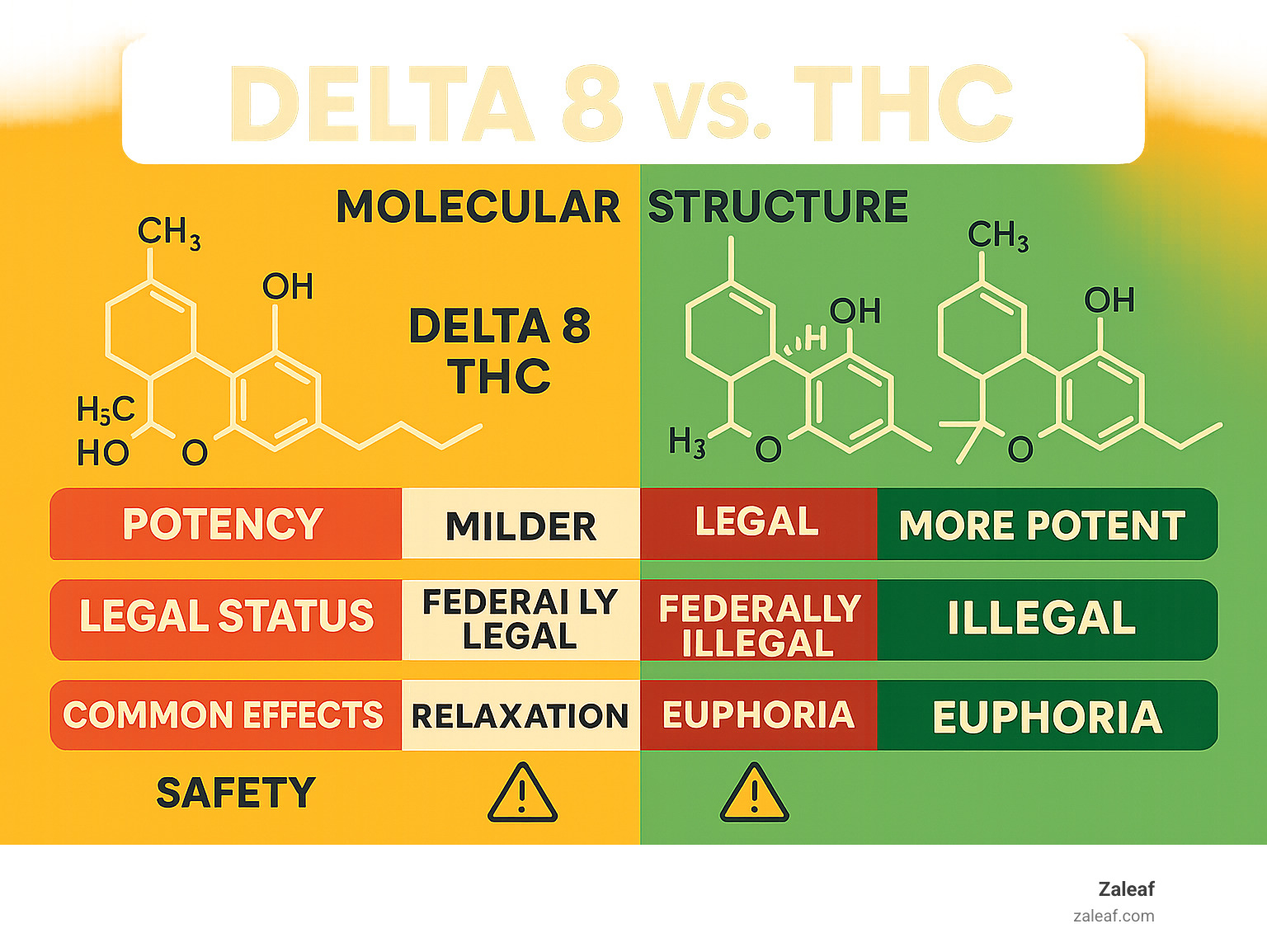
Simple guide to Delta 8 versus THC:
What Are Delta 8 and Delta 9 THC?
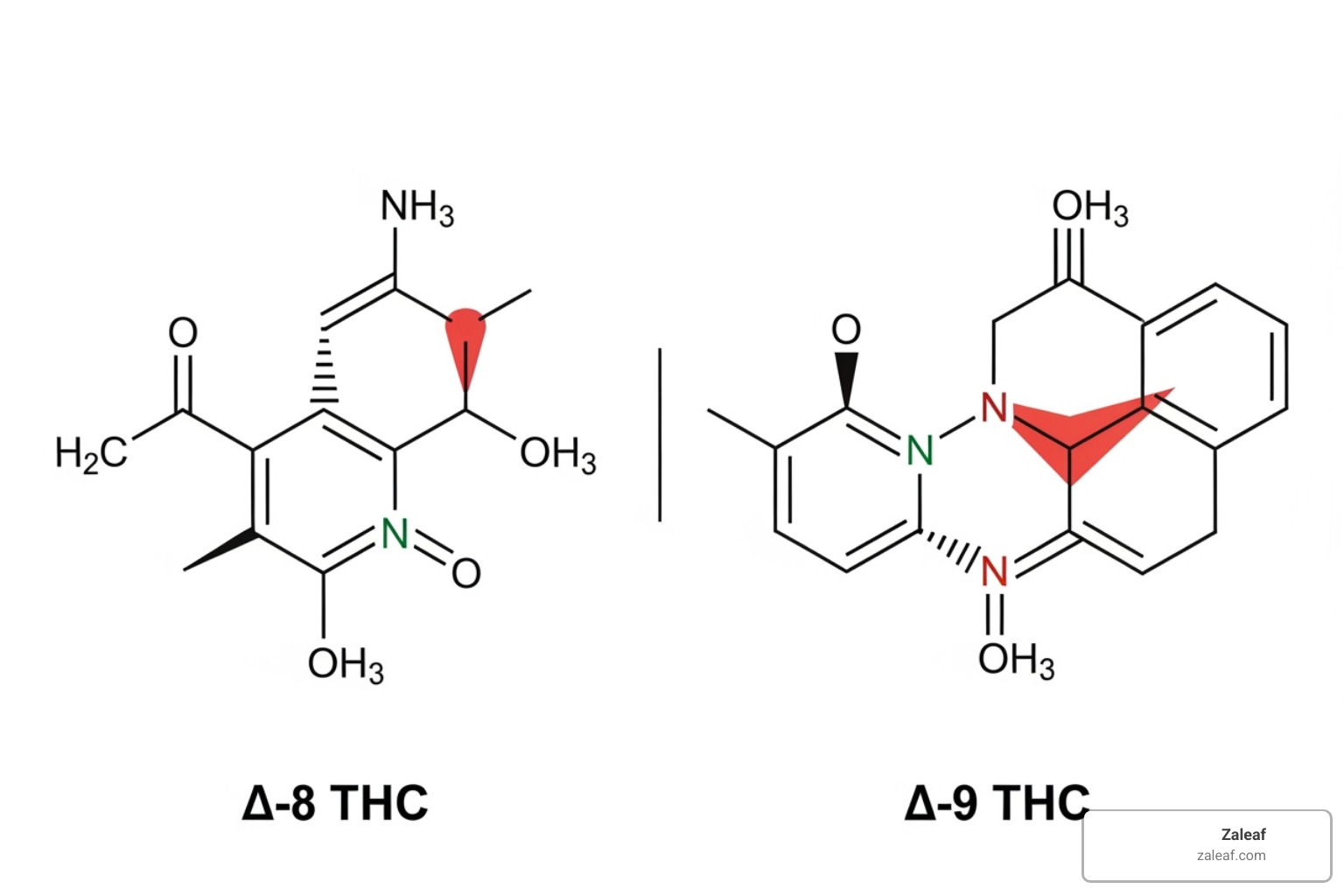
To understand Delta 8 versus THC, we need to start with the science - but don't worry, I'll keep it simple. Both compounds are forms of tetrahydrocannabinol that come from the Cannabis Sativa plant. They're what scientists call isomers, which basically means they're made of the exact same ingredients but arranged slightly differently.
Think of it like two identical LEGO sets where someone moved just one piece. That tiny change makes all the difference in how they work in your body.
The key difference is where a double bond sits in their molecular structure. Delta 8 has this bond on the 8th carbon atom, while Delta 9 has it on the 9th. This might sound like chemistry class, but this small shift completely changes how each compound interacts with your endocannabinoid system.
Both compounds work by binding to CB1 and CB2 receptors throughout your body. The CB1 receptors in your brain and nervous system are responsible for the psychoactive effects you feel, while CB2 receptors in your immune system handle other functions. The way these bonds form determines whether you get a mild buzz or feel like you're on a rocket ship.
Understanding Delta 9 THC: The Main Event
Delta-9-tetrahydrocannabinol is the star of the show - the primary psychoactive compound that's made marijuana famous (and infamous) for decades. When someone says "THC," they're almost always talking about Delta 9.
This compound occurs naturally and abundantly in marijuana plants. We're talking about concentrations that can reach 30% by weight in some strains. That's a lot of psychoactive power packed into those green buds.
Delta 9 delivers what most people consider the classic cannabis experience: intense euphoria, altered time perception, and sometimes overwhelming psychoactive effects. It's been extensively researched for over 70 years, making it one of the most well-understood cannabinoids.
The medical world has taken notice too. The FDA has approved synthetic Delta 9 medications like dronabinol (Marinol) for specific conditions. Research shows promise for appetite stimulation, nausea relief, and pain management. More info on Delta 9 dives deeper into these therapeutic applications.
For those interested in the scientific backing, research on medical uses of THC provides comprehensive evidence of its potential benefits.
Understanding Delta 8 THC: The Newcomer
Delta-8-tetrahydrocannabinol is the new kid on the block, though it was actually finded back in the 1940s. It's what we call a minor cannabinoid because it naturally occurs in cannabis plants in tiny amounts - usually less than 0.1%.
Here's where things get interesting in the Delta 8 versus THC conversation. Since Delta 8 exists in such small quantities naturally, most commercial products aren't extracted directly from plants. Instead, manufacturers create it by chemically converting hemp-derived CBD through a process called isomerization. It's like molecular origami - same materials, different shape.
Users often describe Delta 8 as "marijuana-lite" because it provides a much milder high compared to its Delta 9 cousin. Many people report feeling clear-headed and functional while still getting the relaxing benefits they're looking for. It's become popular among those who want to dip their toes into THC waters without diving into the deep end.
The effects tend to be more relaxing and less likely to cause anxiety or paranoia - common concerns with Delta 9. A deep dive into Delta 8 explores these unique characteristics in detail.
It's worth mentioning that Delta-10 is another analog that's even less common than Delta 8, with reportedly even milder effects. However, research on Delta-10 is extremely limited, making it more of a curiosity than a practical option for most users.
The Core Differences: Delta 8 versus THC
| Aspect | Delta 8 THC | Delta 9 THC |
|---|---|---|
| Potency | ~50-70% as strong | Full strength |
| Common Effects | Clear-headed, relaxing, manageable | Intense euphoria, potential anxiety |
| Source | Hemp-derived (converted from CBD) | Marijuana (naturally abundant) |
| Federal Legal Status | Legal gray area | Federally illegal |
When it comes to Delta 8 versus THC, the differences go far beyond just chemical structure. These two compounds create distinctly different experiences, and understanding these differences can help you make the right choice for your needs.
The most obvious difference is potency. Delta 8 delivers roughly 50-70% of the strength you'd get from Delta 9. This isn't just about needing a bigger dose - it's about the entire character of the high being different. Think of it like comparing a gentle wave to a tsunami. Both will get you wet, but one is much more manageable than the other.
Psychoactive Effects: A Clear Look at Delta 8 versus THC
Delta 9 THC is the heavyweight champion of cannabis compounds. When you consume it, you're signing up for the full cannabis experience - intense euphoria, heightened senses, and that classic feeling where time seems to crawl. Your favorite song might feel like it's playing for an hour, and you might find yourself staring at your hands wondering if they've always looked that interesting.
But Delta 9 has a darker side. Many users experience anxiety or paranoia, especially at higher doses. You know that feeling when you're convinced everyone at the grocery store knows you're high? That's Delta 9 being a bit too enthusiastic about its job. Some people end up with "couchlock" - feeling so heavy and relaxed that moving feels impossible.
Delta 8 takes a completely different approach. Users consistently describe it as providing a smoother, more manageable high. You'll feel relaxed and uplifted, but you can still hold a conversation, tackle work tasks, or run errands without feeling like you're operating heavy machinery. It's like having a gentle buzz that keeps you functional.
A 1973 study comparing effects found that Delta 8 produced less anxiety and paranoia than Delta 9, though this early research had limitations. Modern user experiences seem to back this up - many people who struggle with Delta 9's intensity find Delta 8 much more their speed.
The duration is another key difference. Delta 8 typically lasts 1-2 hours, while Delta 9 can keep you liftd for 3-6 hours (and sometimes you'll still feel effects the next day). This makes Delta 8 appealing if you want to dip your toes in the water without committing to a full day of being high.
Potential Therapeutic and Medical Benefits
Both compounds show promise for various health conditions, but their different effects profiles make them suitable for different situations.
Delta 9 THC has the advantage of decades of research. It's proven effective for appetite stimulation (the FDA actually approved it for this), nausea relief during chemotherapy, chronic pain management, and sleep support. It's also being studied for anxiety, glaucoma, muscle spasticity, and PTSD.
Delta 8 THC is the newcomer with promising early results. Users report it's particularly helpful for stress and anxiety relief without the overwhelming effects that sometimes come with Delta 9. People also use it for chronic pain, depression support, and sleep issues. Interestingly, a 1995 study found it completely eliminated nausea in pediatric cancer patients.
A 2021 study on consumer experiences surveyed 521 Delta 8 users and found that about half were using it for medical reasons. Many reported it as an effective substitute for Delta 9 but with fewer intense side effects.
Here's the catch: while Delta 9 has decades of scientific backing, Delta 8 research is still in its early stages. Most of what we know comes from user reports and limited studies. More on Delta 8's health benefits provides additional context on current research, but it's important to approach these potential benefits with realistic expectations.
The Delta 8 versus THC choice often comes down to whether you want the full-strength experience or prefer something more subtle and manageable. Both have their place, but understanding these differences helps you choose what's right for your lifestyle and tolerance level.
Safety, Legality, and Production Concerns
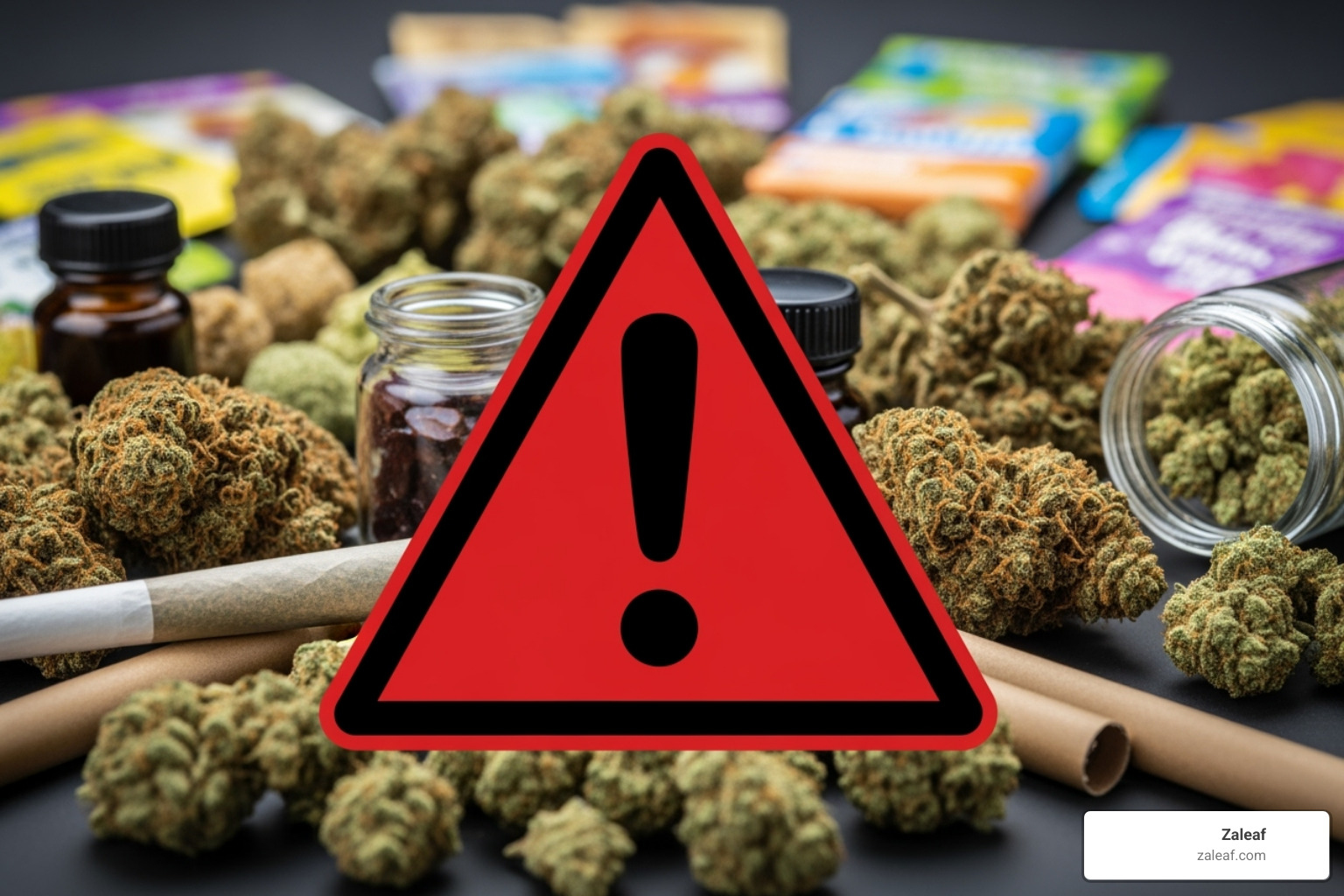
When it comes to Delta 8 versus THC, the safety picture looks very different for each compound. While Delta 9 products in legal states go through strict testing and quality control, Delta 8 operates in a wild west of unregulated production that should make any consumer pause.
The 2018 Farm Bill opened the door for hemp-derived products, but it also created a massive loophole that manufacturers have rushed to exploit. The result? A market flooded with products that may contain dangerous contaminants, unknown byproducts, and inconsistent potency levels.
How Are Delta 8 Products Made?
Here's where things get genuinely concerning. Since Delta 8 naturally occurs in such tiny amounts - we're talking about needing 15-20% concentration for economical extraction - virtually every Delta 8 product you see was made in a lab, not extracted from plants.
The process starts with CBD extraction from hemp, which is perfectly legal and safe. But then comes the tricky part: chemical conversion through a process called isomerization. Manufacturers use acids, heat, and sometimes metal catalysts to rearrange the CBD molecules into Delta 8 THC.
Think of it like performing surgery on molecules. You're taking apart the CBD structure and rebuilding it as Delta 8. The problem? This process can create up to 30 unidentified byproducts that manufacturers often don't know how to identify, let alone remove.
Many producers skip the expensive purification step entirely. Without proper distillation or chromatography, these unknown by-products end up in the final product. One analytical chemist who's tested thousands of samples told Chemical & Engineering News that he hasn't seen "one legitimate delta-8-THC product" in his lab.
The conversion process requires aggressive synthetic conditions and potentially dangerous solvents like dichloromethane. One expert called this chemical a "silent killer" that requires proper ventilation - something many small-scale producers lack. Concerns from chemists about synthesis highlight just how risky this unregulated manufacturing can be.
Side Effects and Reported Risks
Both Delta 8 and Delta 9 share the typical THC side effects you'd expect: dry mouth, red eyes, impaired coordination, and memory issues. These are generally mild and temporary for most users.
But Delta 8 products carry additional risks that go beyond normal THC effects. The FDA received 104 adverse event reports between December 2020 and February 2022, with 55% requiring medical intervention or hospitalization. We're talking about serious reactions like hallucinations, vomiting, tremors, and even loss of consciousness.
The poison control statistics are even more alarming. Centers across the country handled 2,362 exposure cases during a similar period, with 41% involving children under 18. One pediatric case resulted in death. The problem? Many Delta 8 products look exactly like candy - gummies, chocolates, and colorful packaging that appeals to kids.
The 5 Things to Know About Delta-8 THC from the FDA makes it clear that these aren't just isolated incidents. The agency is seeing a pattern of serious adverse events that they directly link to unregulated production methods.
Legal Labyrinth: Navigating the Law for Delta 8 versus THC
If you think the safety concerns are complicated, wait until you hear about the legal situation. The Delta 8 versus THC legal landscape is like trying to steer a maze blindfolded while the walls keep moving.
Delta 9 THC is straightforward - it's federally illegal as a Schedule I controlled substance, though many states have created their own legal markets with proper regulation and testing requirements.
Delta 8 exists in what lawyers call a legal gray area created by the 2018 Farm Bill. The law legalized hemp and its derivatives containing less than 0.3% Delta-9 THC by dry weight. Since Delta 8 can be made from legal hemp CBD, manufacturers argue it falls under this protection.
But here's where it gets messy. The DEA has recently stated that any THC is forbidden, contradicting the Farm Bill interpretation. Meanwhile, states are creating their own patchwork of laws. Some have banned Delta 8 entirely, others regulate it like marijuana, and some allow it to be sold without any oversight.
Currently, 30 states allow Delta 8 products, while more than a dozen states have banned them outright. Five states have established specific regulations, and 16 states include Delta 8 in their definition of marijuana or THC. The situation changes so frequently that what's legal today might not be tomorrow.
Are Delta 8 gummies legal? provides current state-by-state guidance, but honestly, the landscape shifts so often that you need to check local laws before purchasing or traveling with these products.
The bottom line? This legal loophole has created a market where products can be sold without the safety standards applied to either traditional cannabis or FDA-regulated substances. That's a recipe for problems, and we're already seeing the consequences.
Making an Informed Choice: What Consumers Need to Know
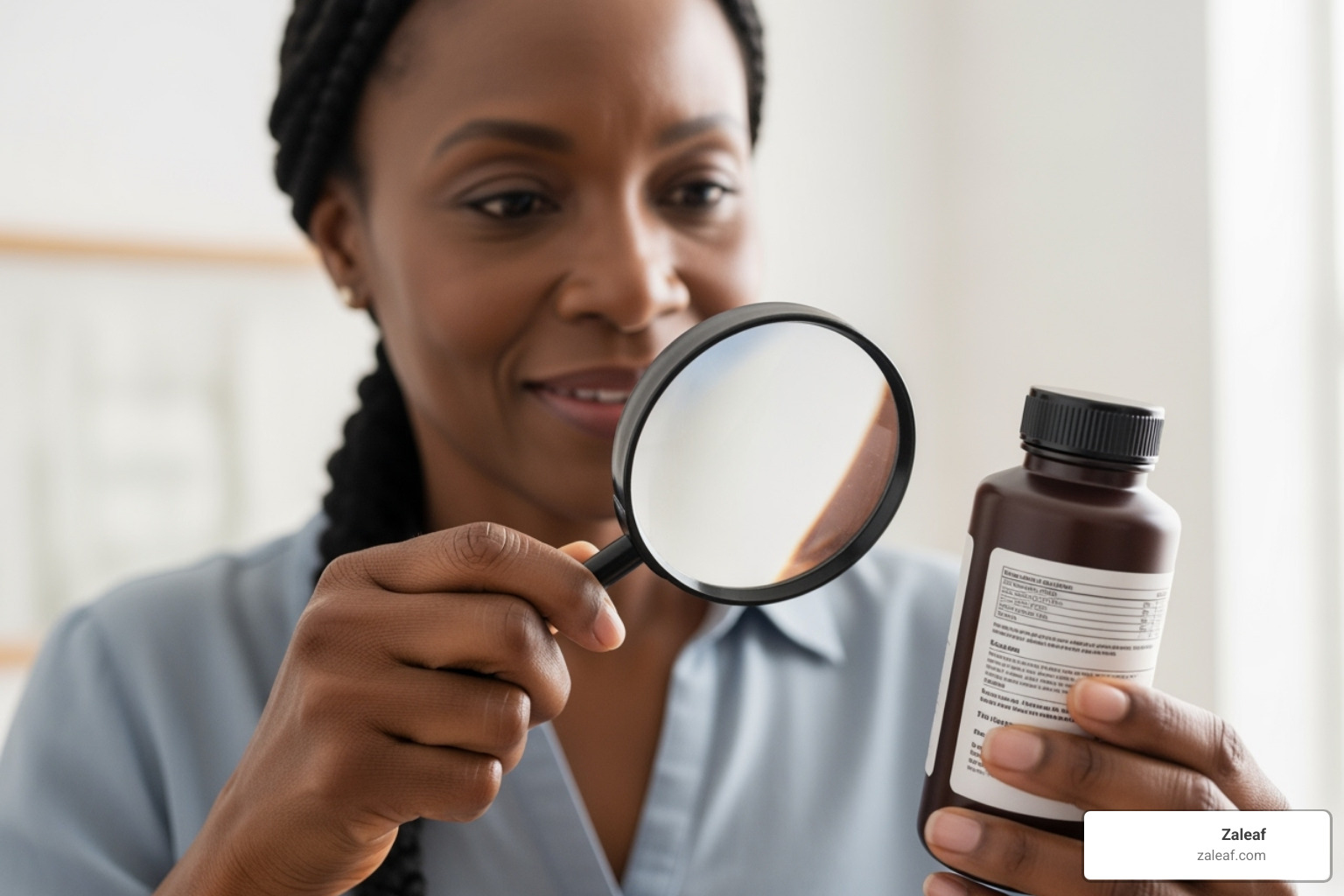
After everything we've covered about Delta 8 versus THC, you're probably wondering how to actually choose a safe, effective product. Given the wild west nature of the Delta 8 market, being an informed consumer isn't just helpful - it's essential for your safety.
The harsh reality is that many Delta 8 products on the market contain harmful contaminants, inaccurate labeling, or dangerous byproducts from poor manufacturing. But don't worry - with the right knowledge, you can spot quality products from a mile away.
Reading the Label and Lab Reports
Think of a Certificate of Analysis (COA) as your product's report card. If a company won't show you their grades, would you trust them with your health? At Zaleaf, we make our COAs easily accessible because transparency builds trust. If any company doesn't readily provide third-party lab results, that's your first red flag.
Here's what you need to look for in a proper COA. The cannabinoid profile should confirm the actual Delta 8 content and ensure Delta 9 THC stays below that crucial 0.3% legal limit. Many products we've tested contain wildly different amounts than what's on the label - sometimes dangerously high levels of Delta 9 that could get you in legal trouble.
The terpene profile shows additional compounds that can significantly affect your experience. Some terpenes promote relaxation while others boost energy, so this information helps you choose products that match your desired effects.
Pesticide testing is absolutely critical since hemp plants are notorious for absorbing chemicals from soil. You definitely don't want to be inhaling or ingesting agricultural toxins along with your cannabinoids.
Heavy metals testing checks for lead, mercury, cadmium, and arsenic - all of which can accumulate in your body over time and cause serious health problems. Residual solvents testing ensures those dangerous chemicals used in Delta 8 production have been properly removed.
Finally, microbials testing screens for harmful bacteria, yeast, and mold that could make you sick. This is especially important for products that might sit on shelves for months.
Choosing the Right Product for You
The world of cannabinoid products can feel overwhelming, but understanding your options makes the choice much clearer. Gummies remain the most popular choice because they're easy to dose and provide long-lasting effects. Expect onset times of 30 minutes to 2 hours, with effects lasting 2-3 hours. Just remember that Delta 8 gummies typically contain 25mg compared to 10mg for Delta 9, reflecting the lower potency.
Tinctures offer more precise dosing control and faster onset times of 15-30 minutes when held under your tongue. They're perfect if you want to fine-tune your experience or need something that kicks in relatively quickly.
Vapes provide the fastest effects at 5-10 minutes, making them ideal if you want immediate relief or prefer shorter duration effects. Comparing Delta 8 and Delta 9 vape pens can help you understand how different consumption methods affect your experience.
Topicals offer localized effects without any psychoactive impact, making them perfect for targeted pain relief or skin conditions.
No matter which product type you choose, the golden rule remains: start low and go slow. If you're new to cannabinoids, begin with half the recommended dose and wait at least 2 hours before taking more, especially with edibles. Your body needs time to process these compounds, and taking more too quickly is the fastest way to have an uncomfortable experience.
The Delta 8 versus THC decision ultimately comes down to your personal preferences for intensity, duration, and legal considerations. Delta 8 offers a gentler introduction to THC effects, while Delta 9 provides the full-strength experience that many users prefer.
Frequently Asked Questions about Delta 8 and THC
Will using Delta 8 or Delta 9 make me fail a drug test?
Unfortunately, yes - both Delta 8 and Delta 9 will almost certainly cause you to fail a drug test. This is one of the most important things to understand about Delta 8 versus THC when it comes to employment or legal consequences.
Here's why: Standard drug tests don't actually look for Delta 8 or Delta 9 directly. Instead, they detect THC-COOH, a metabolite that your body produces when breaking down any form of THC. Current commercial drug tests can't tell the difference between metabolites from Delta 8, Delta 9, or any other THC variant.
The detection window varies depending on the test type. Urine tests can detect THC metabolites for 3-30 days depending on how frequently you use products. Blood tests typically catch usage within 1-3 days, while hair tests can go back up to 90 days.
If your job, probation, or any legal situation requires passing drug tests, it's best to avoid all THC products completely - regardless of whether they're legal in your state or derived from hemp.
Is Delta 8 considered "synthetic" THC?
This question gets complicated quickly, and the answer depends on how you define "synthetic." Delta 8 does occur naturally in cannabis plants, but only in trace amounts - usually less than 0.1% by weight. This tiny concentration makes direct extraction economically impossible.
Most commercial Delta 8 products are created by chemically converting hemp-derived CBD through a process called isomerization. Think of it like rearranging LEGO blocks to build something slightly different - same pieces, new structure.
The DEA has issued opinions classifying this chemically derived Delta 8 as synthetic, which would potentially make it illegal under synthetic cannabinoid laws. However, this interpretation is actively debated in courts, and the legal status remains complex and unclear.
The "synthetic" label often carries negative connotations, but the conversion process itself doesn't necessarily make Delta 8 dangerous. The real concern is the lack of regulation and quality control in how these products are made and tested.
Which is stronger, Delta 8 or Delta 9?
Delta 9 is significantly stronger than Delta 8. Most users and researchers estimate Delta 8 to be roughly 50-70% as potent as Delta 9. This means you'd typically need about twice as much Delta 8 to achieve effects similar to what you'd get from Delta 9.
But here's the thing - "stronger" doesn't always mean "better." Many people actually prefer Delta 8's milder effects because they can remain functional and clear-headed while still getting the relaxing benefits of THC. You're less likely to experience the anxiety, paranoia, or overwhelming "couch-lock" that sometimes comes with Delta 9.
The choice between them often comes down to what kind of experience you're looking for. If you want intense euphoria and don't mind potentially strong psychoactive effects, Delta 9 might be your choice. If you prefer a gentler, more manageable high that lets you go about your day, Delta 8 could be perfect.
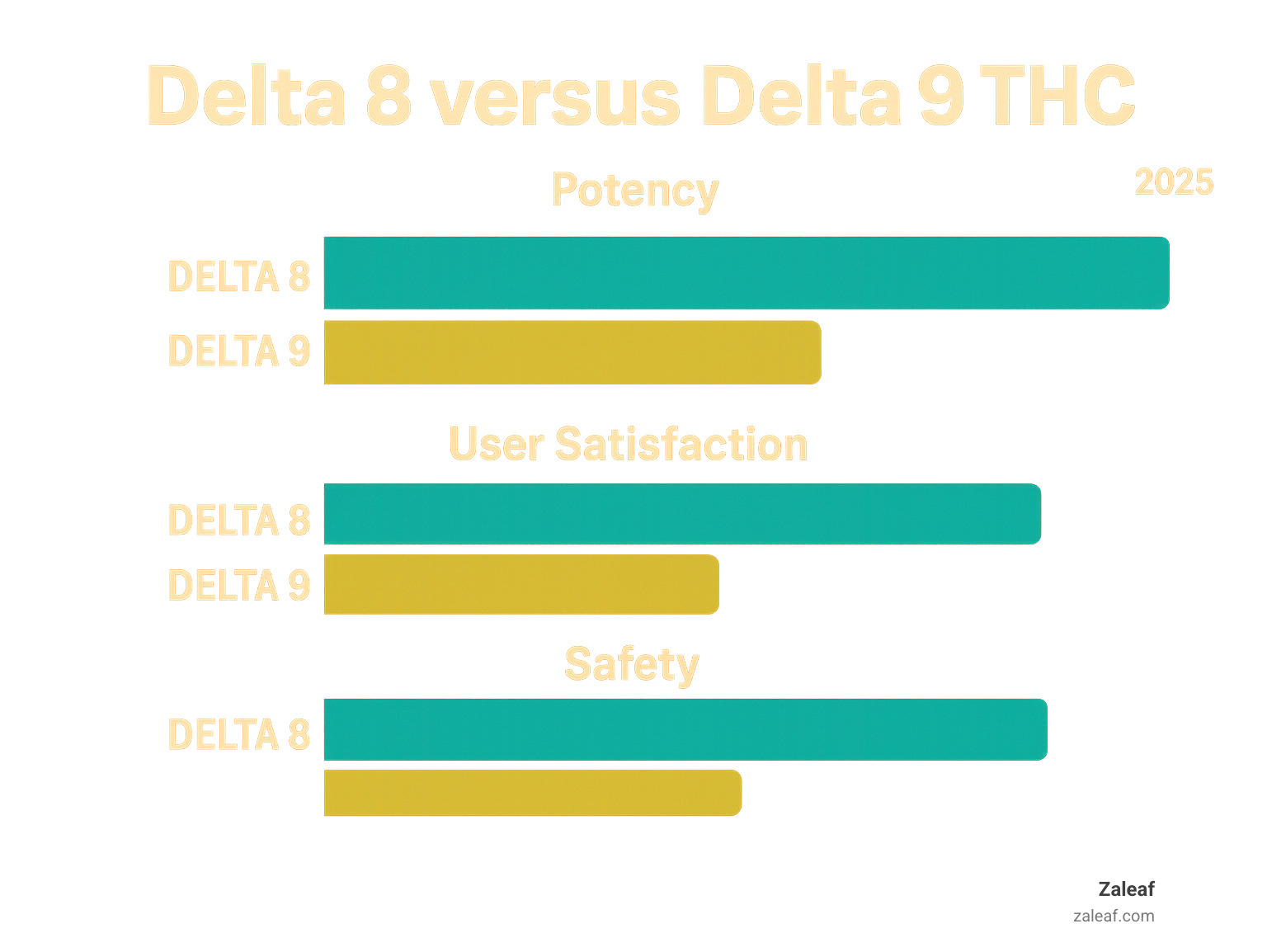
Conclusion: Navigating the World of THC
Understanding Delta 8 versus THC comes down to recognizing key differences in potency, effects, legality, and safety. Delta 9 THC offers a well-researched, potent experience that's highly regulated in legal markets. Delta 8 provides a milder alternative that exists in a legal gray area but comes with significant quality and safety concerns due to lack of regulation.
The most critical takeaway? The unregulated nature of the Delta 8 market makes consumer diligence essential. While Delta 9 products in legal states undergo rigorous testing and quality control, Delta 8 products vary wildly in quality, purity, and safety.
At Zaleaf, we're committed to transparency and safety in everything we do. Our products undergo comprehensive third-party testing, and we provide detailed COAs because we believe you deserve to know exactly what you're consuming. Whether you choose Delta 8 or Delta 9 products, quality and transparency should never be optional.
The cannabinoid landscape will continue evolving as research expands and regulations develop. Until then, educated consumers who prioritize third-party testing and reputable sources will have the safest and most reliable experiences.
Explore our lab-tested cannabis products to see how proper testing and quality control make all the difference in your cannabinoid experience.

